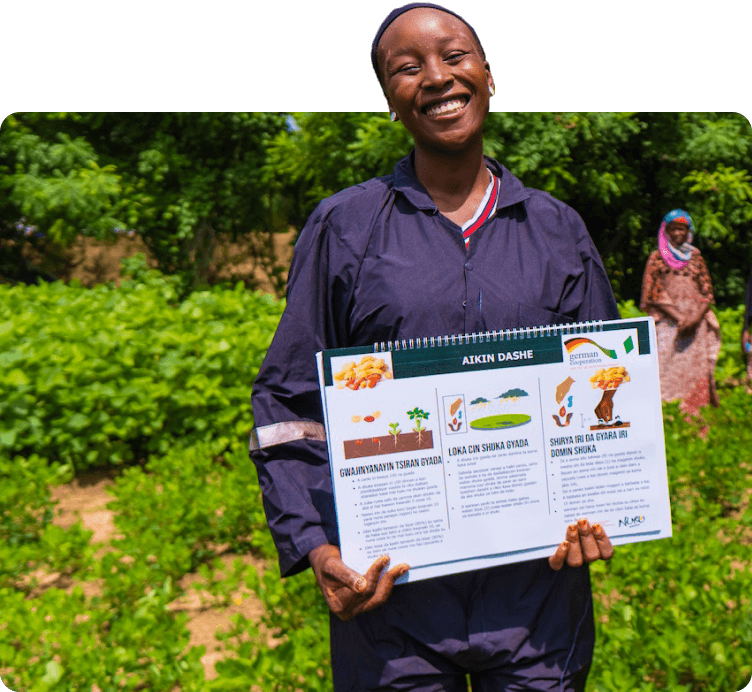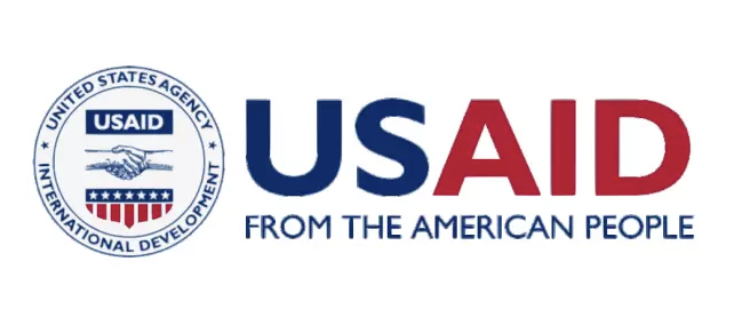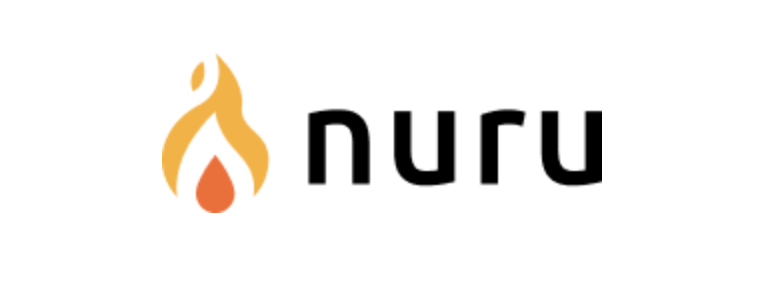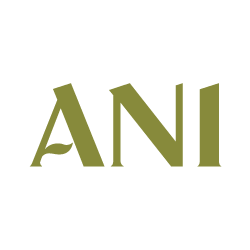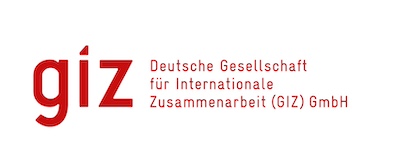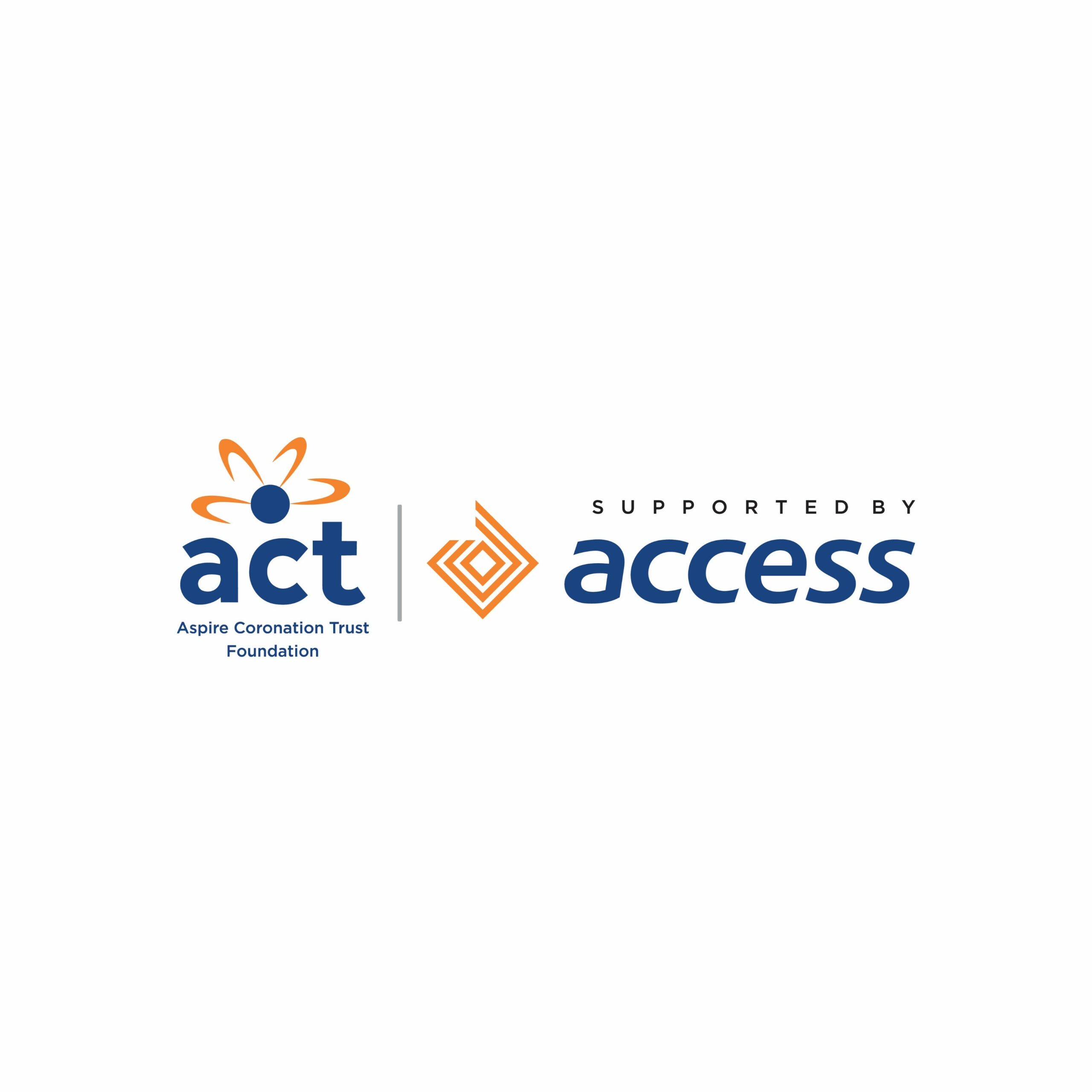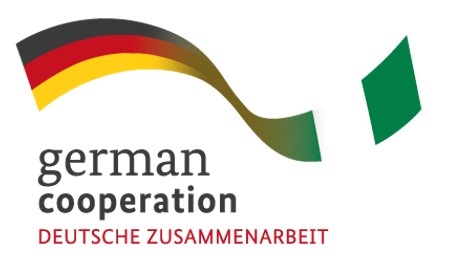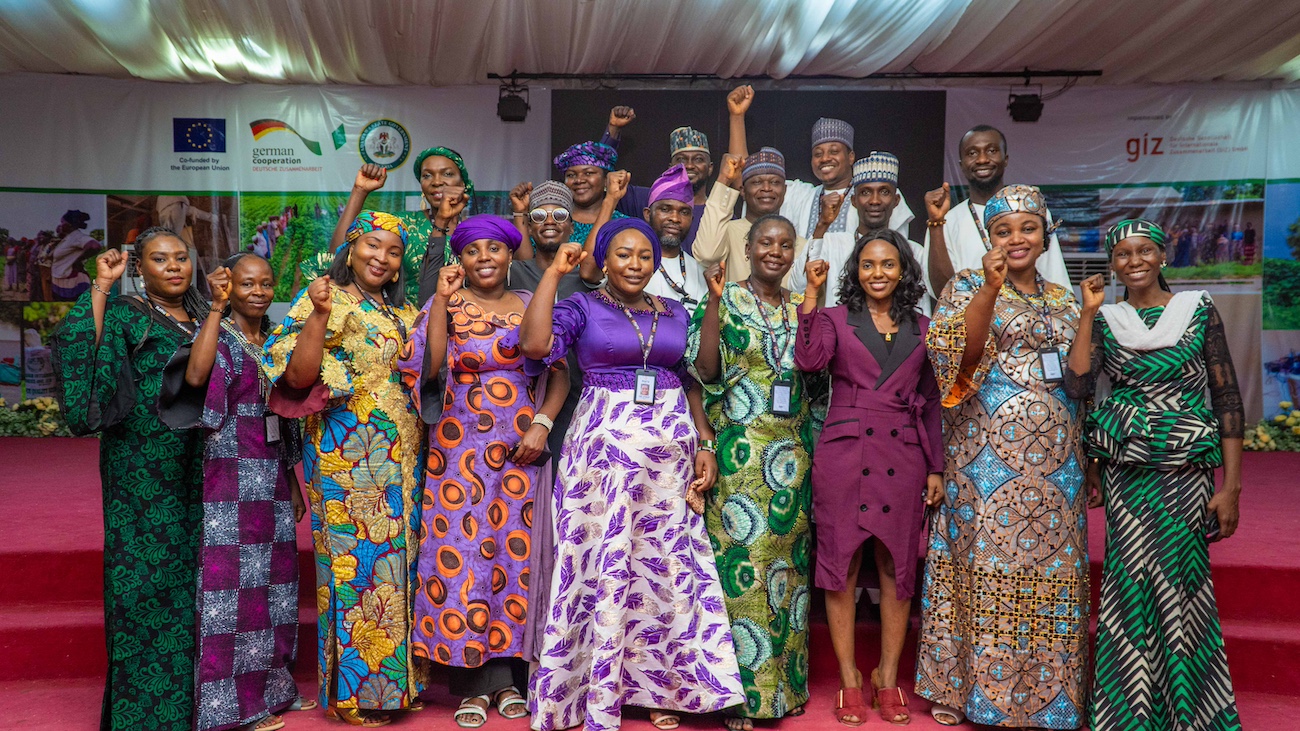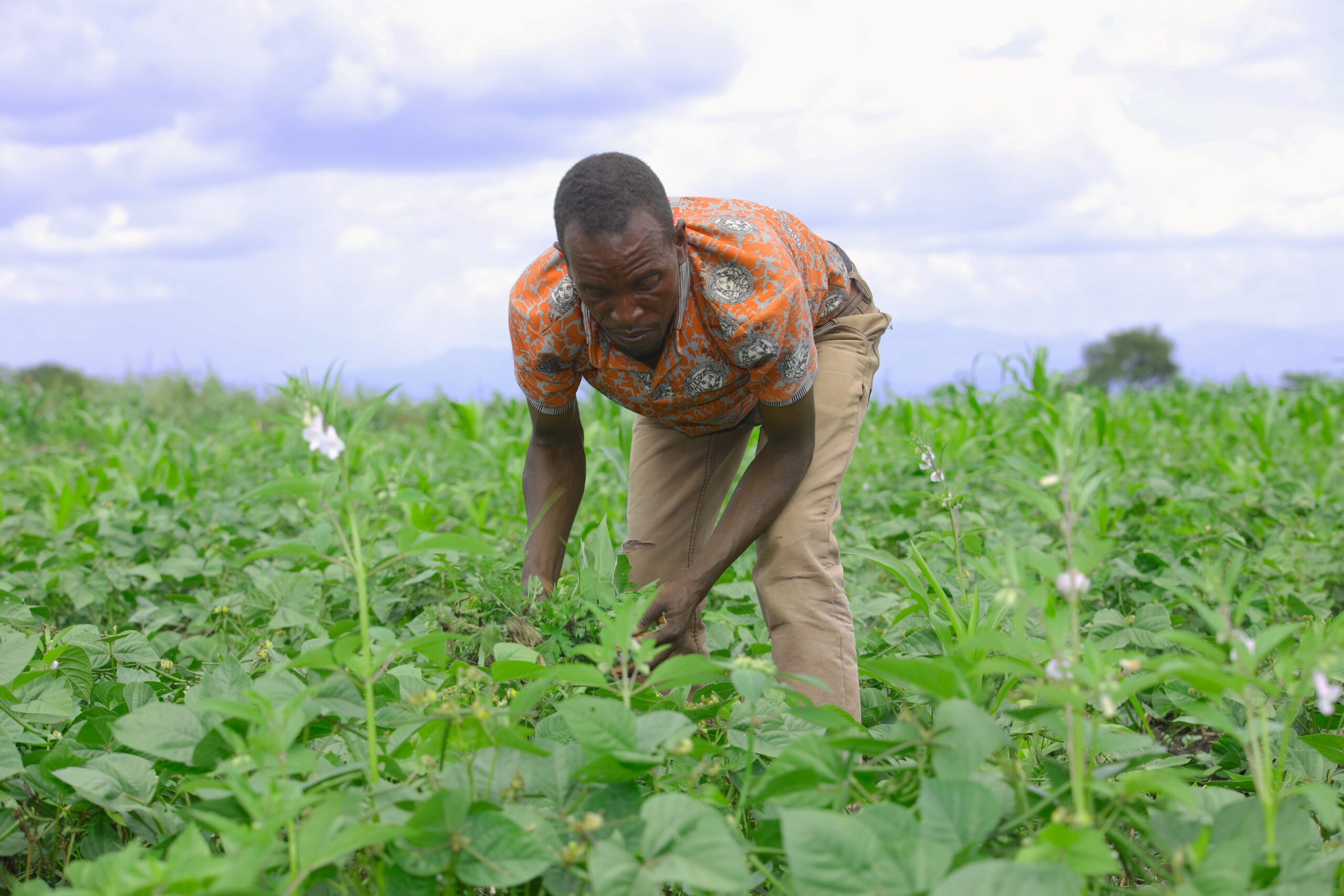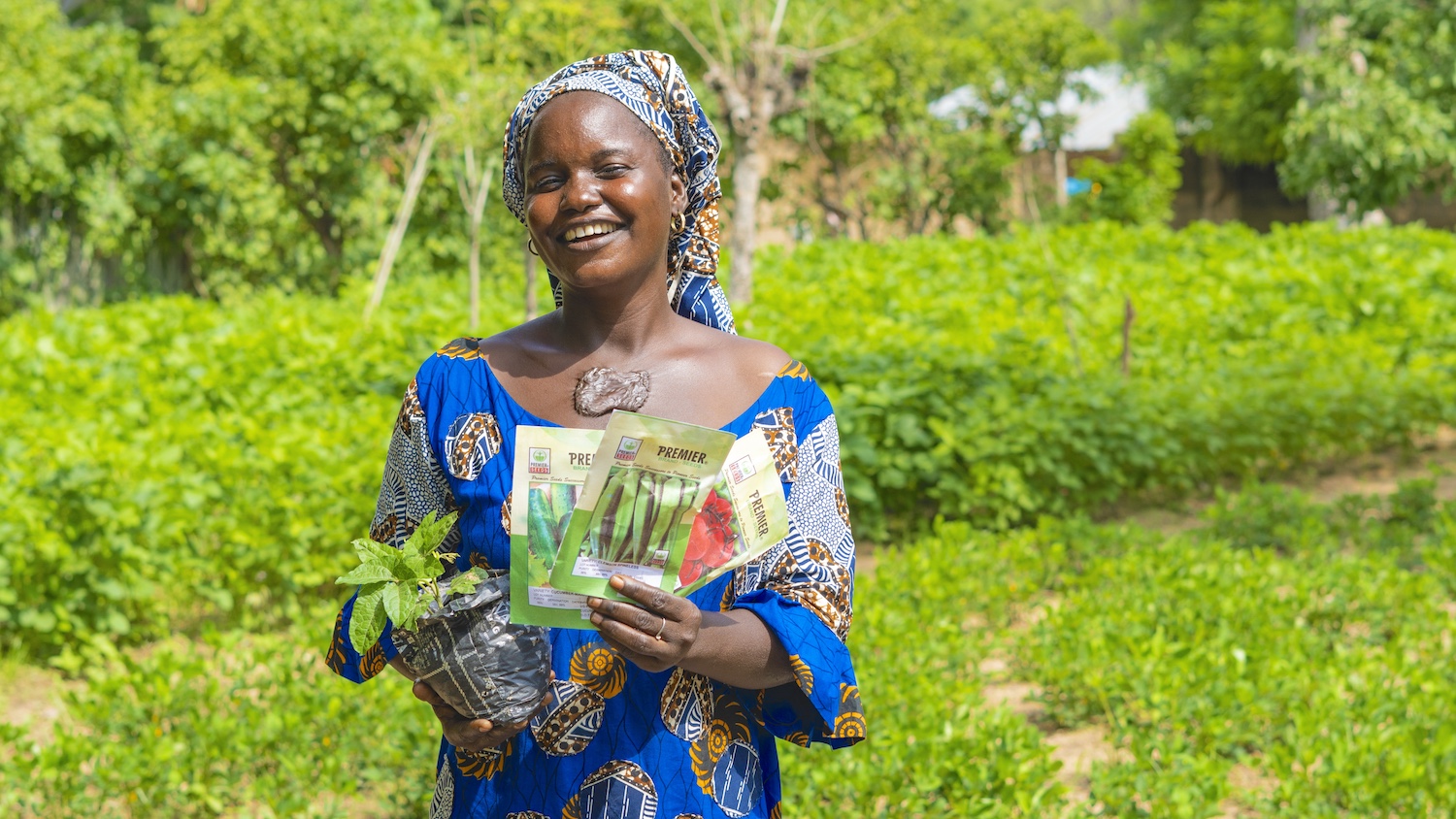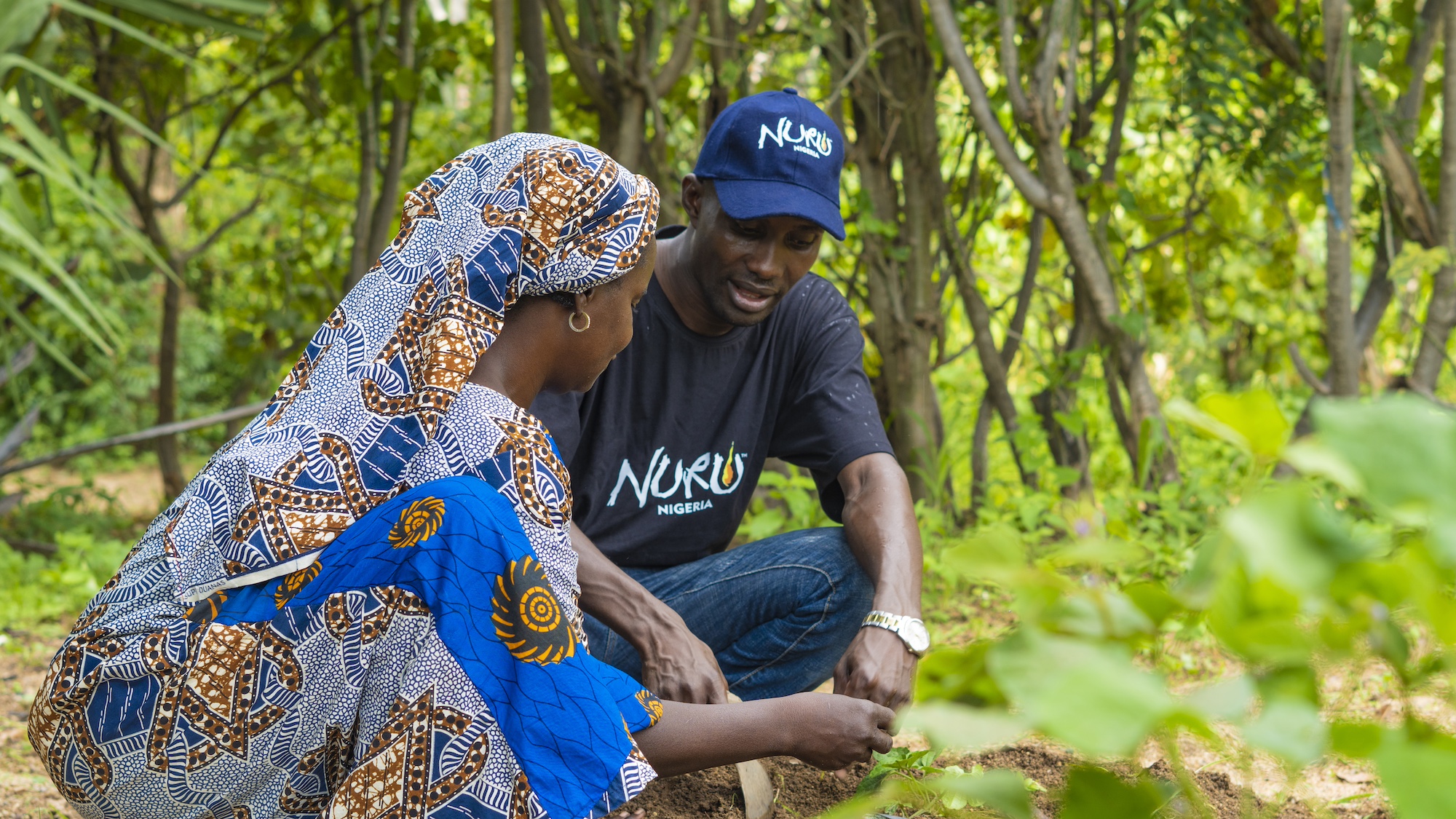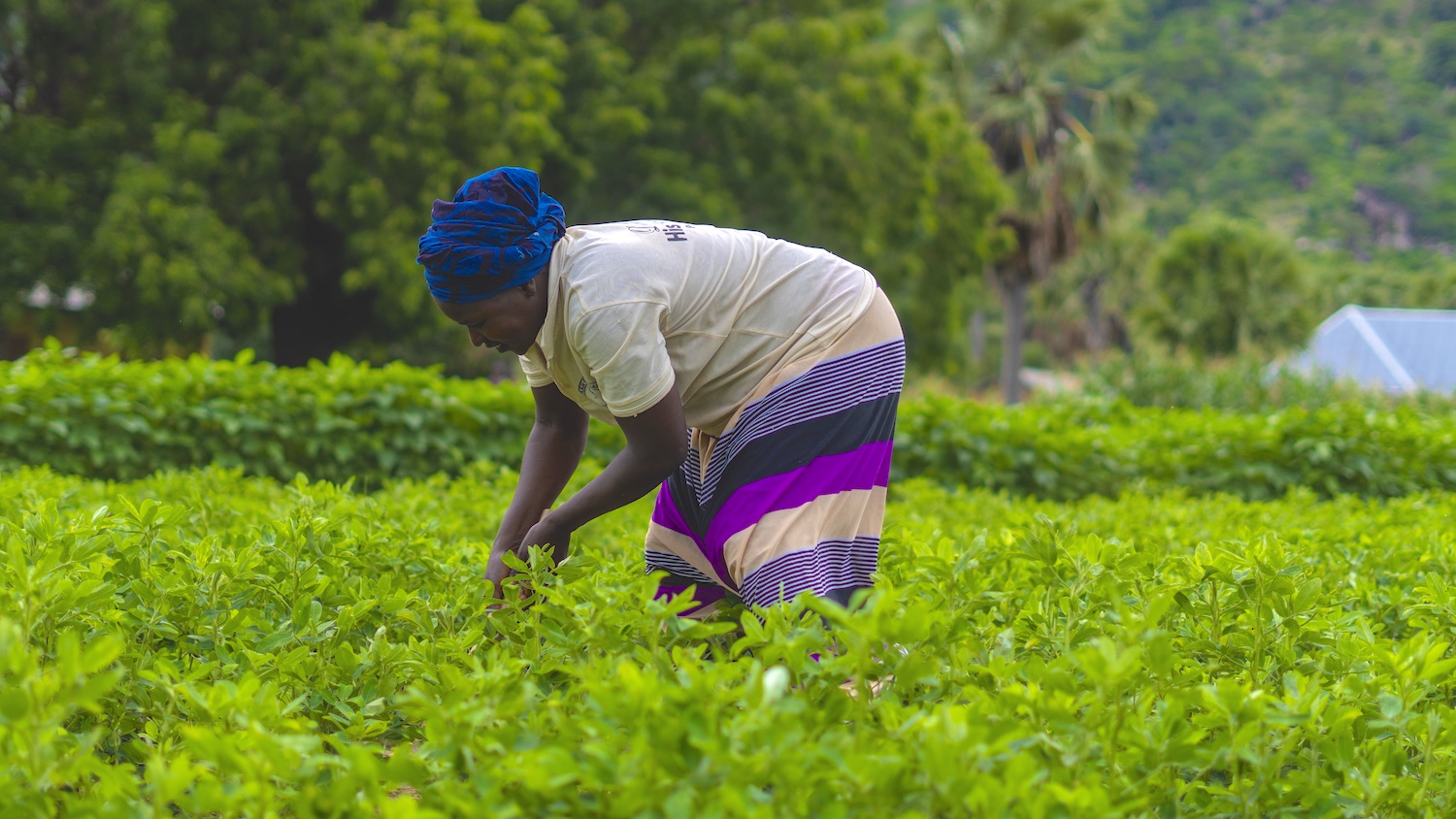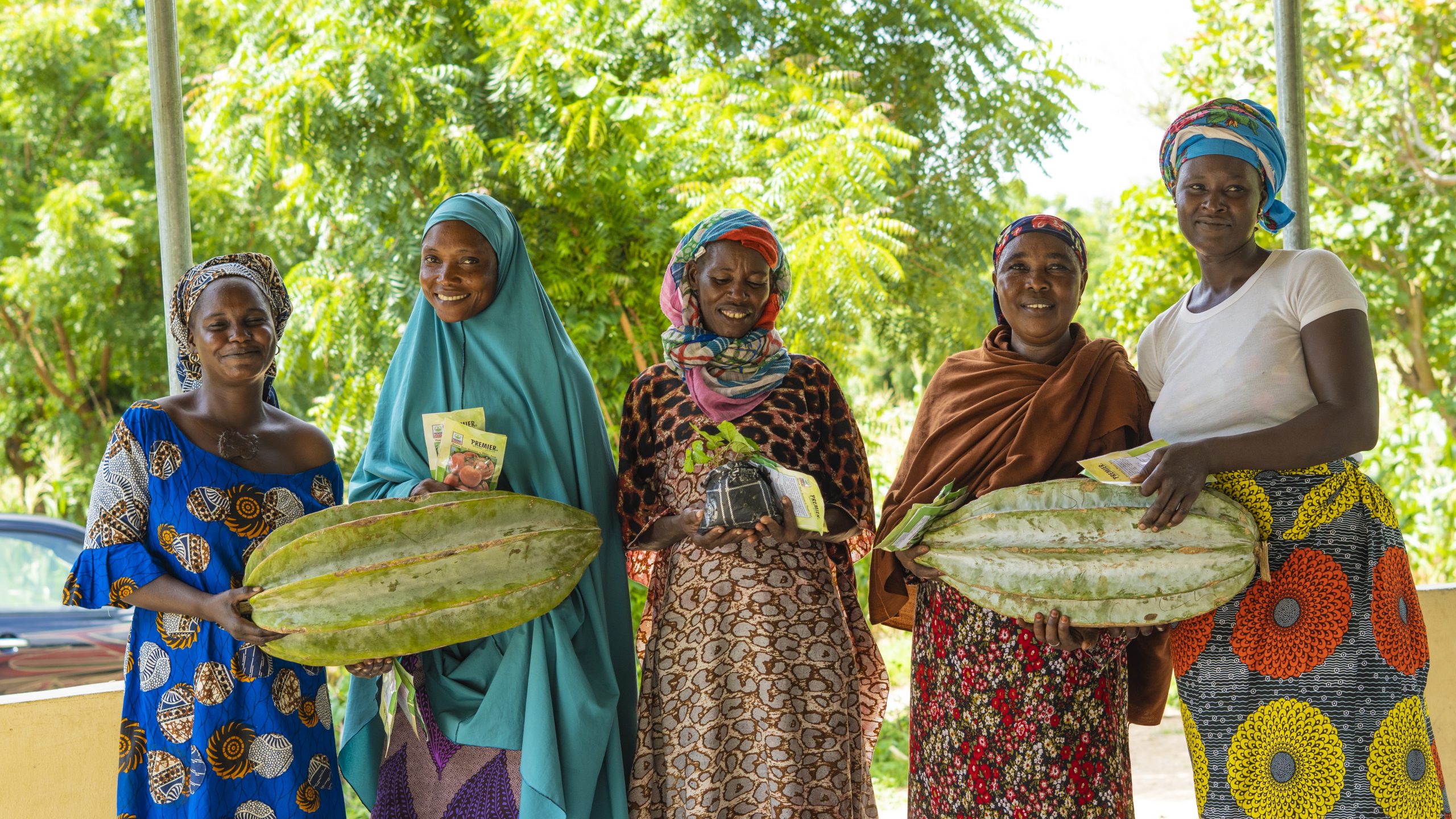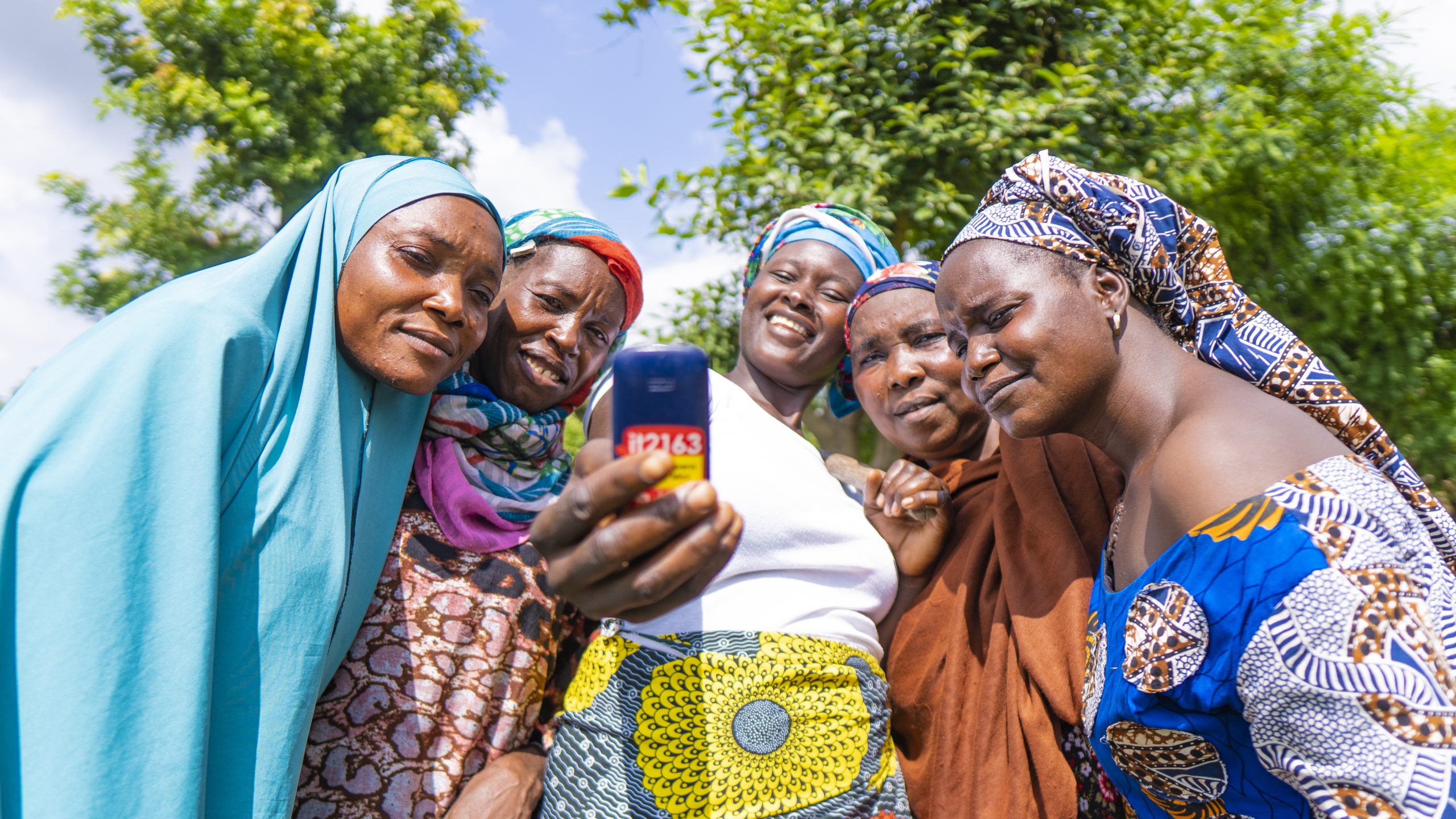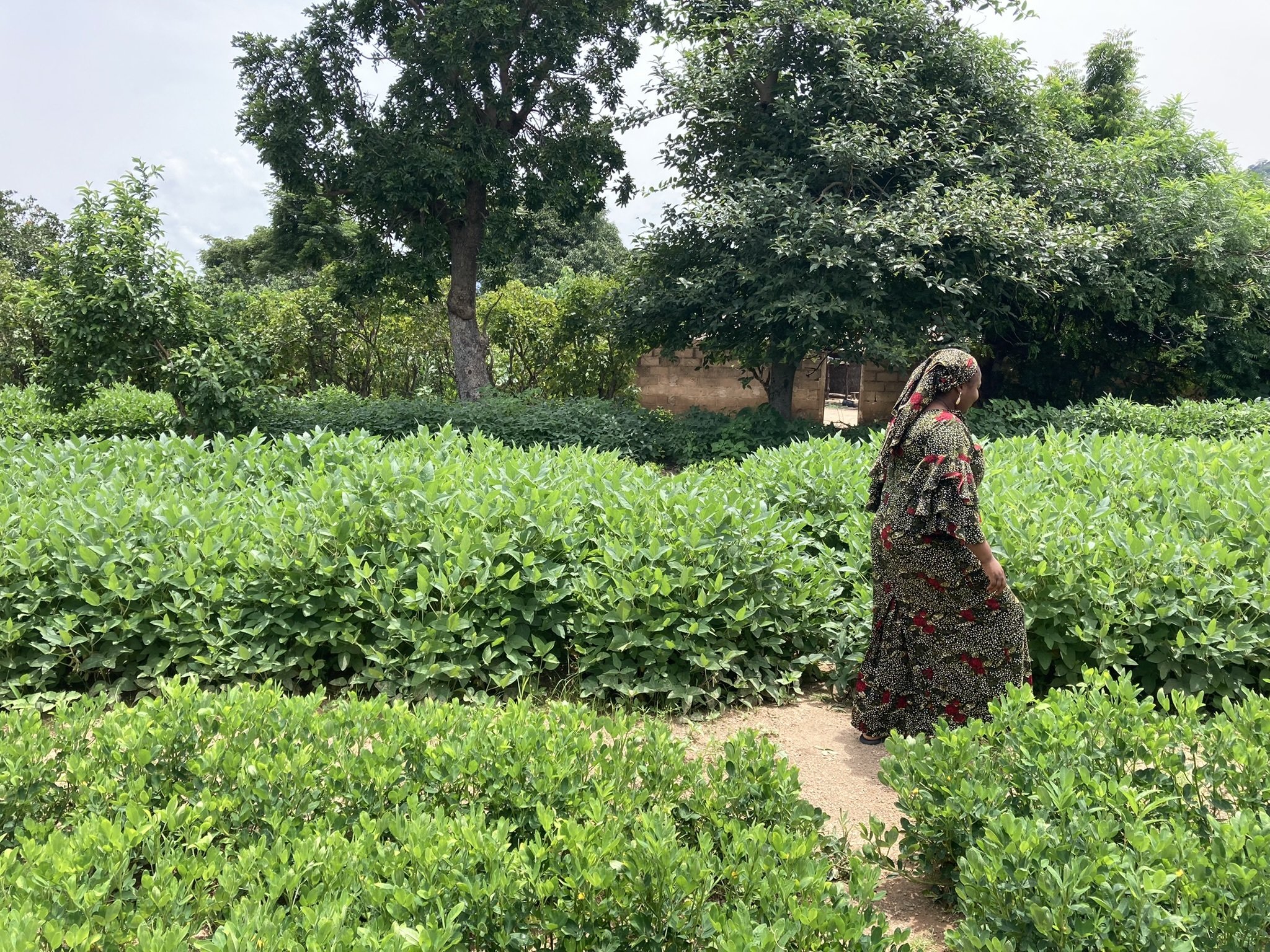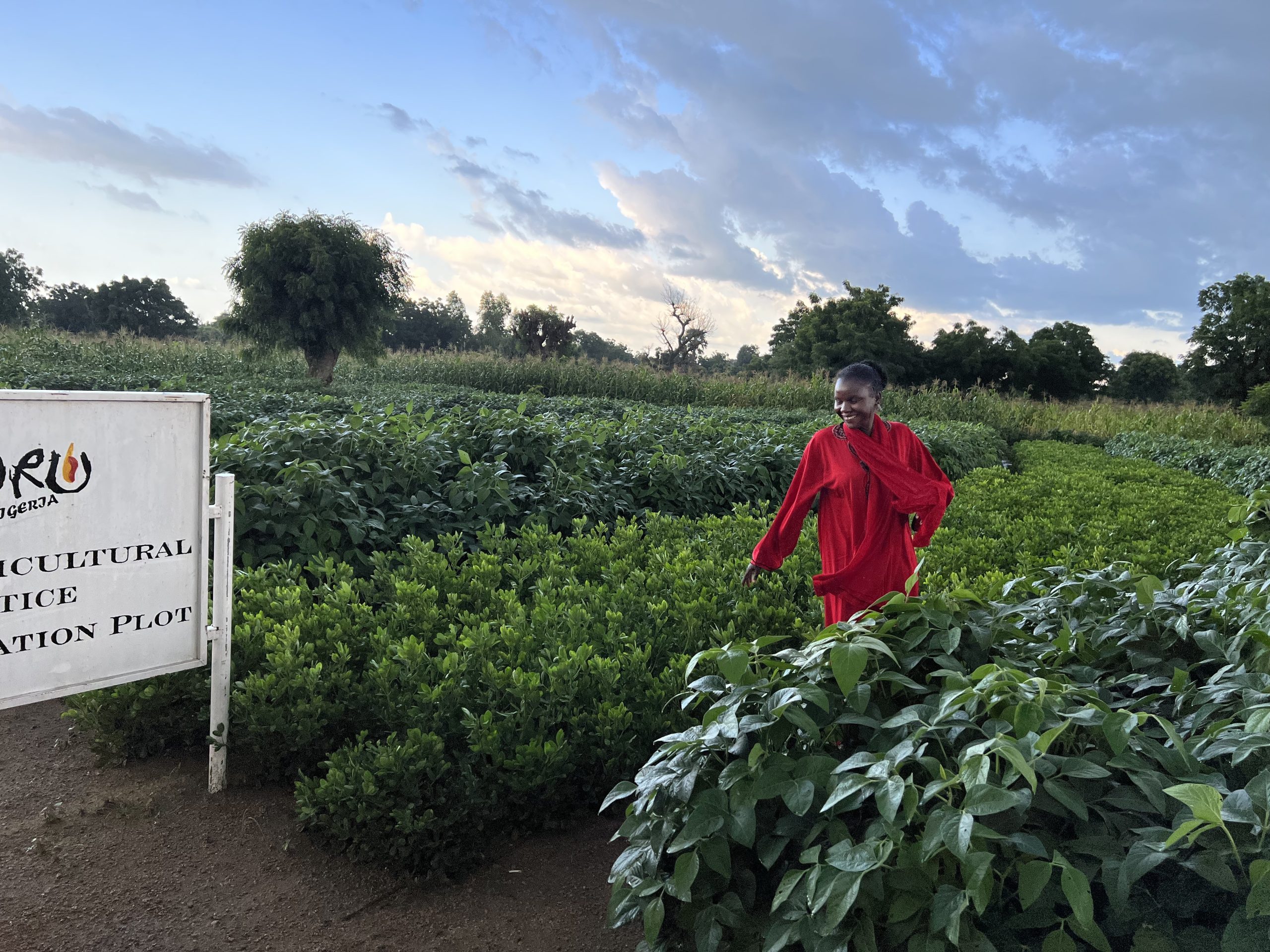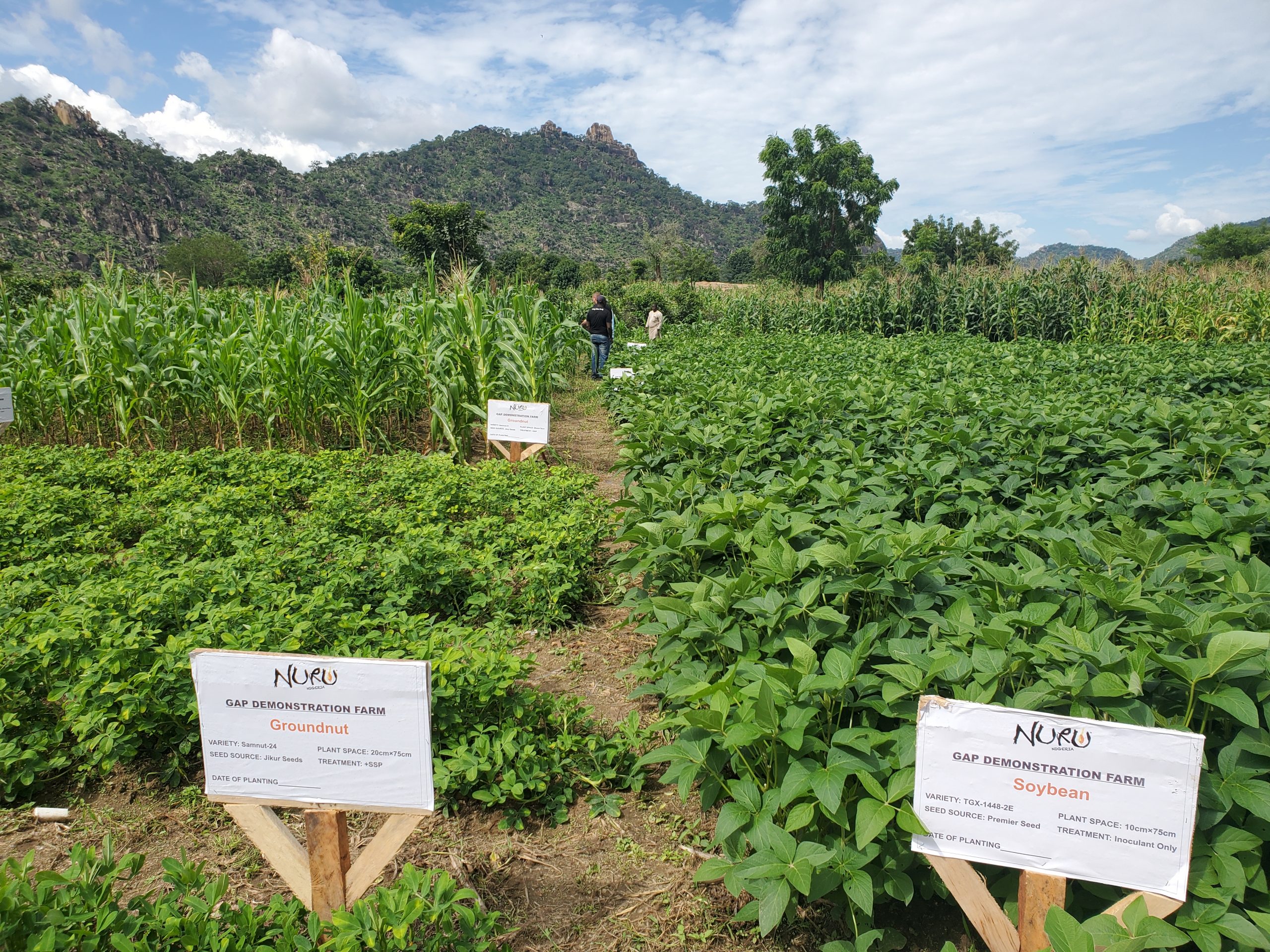The Nuru model in Nigeria
Established in 2018 Nuru Nigeria equips Nigerian farmers and their families to lift themselves out of extreme poverty by moving from subsistence to building thriving farmer-owned and farmer-led agribusinesses. Locally Led Development Headquartered in northeast Nigeria, Nuru Nigeria works with farmers in northern Adamawa State to end extreme poverty and build resilient communities. We are a 100% locally-led organization with locally-designed solutions built for driving long-term positive impact for our farmers.
Model Highlights
-
Community-Based Market Systems
Over a period of five to seven years, Nuru Nigeria works together with local agribusiness leaders to strengthen their entrepreneurship. Nuru Nigeria equips agribusinesses to provide farmers with opportunities to improve their livelihoods and supports the establishment of reliable market linkages for crops and animal husbandry.
-
Inclusive Livelihoods
Nuru Nigeria supports farmers to increase their incomes and build sustainable and profitable farmer agribusinesses. Nuru Nigeria links farmers to regional markets and beyond to increase their profitability.
-
Cultivating Resilience
Nuru Nigeria strengthens communities, local governments, and the private sector in the face of conflict, climate change, and extreme poverty.
-
What Makes Us Unique?
Nuru Nigeria champions gender equity, as the first Nuru Collective member organization to work with women as an entry point to serve families and communities. With a dedication to building long-term resilience, Nuru Nigeria also trains local farmers on climate-smart regenerative agriculture practices, equipping farmers and their communities to adapt to the changing climate.


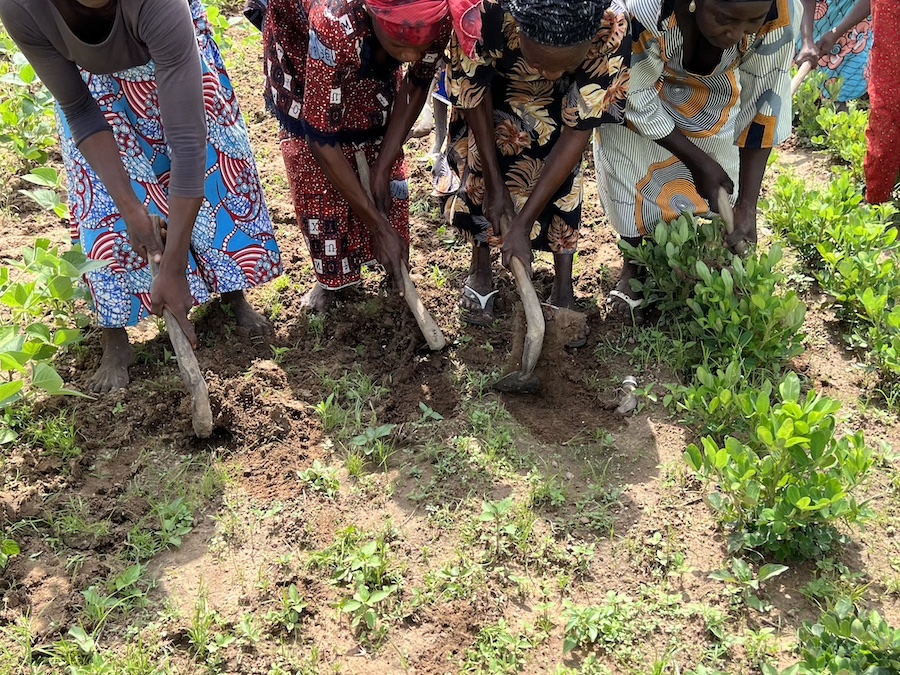
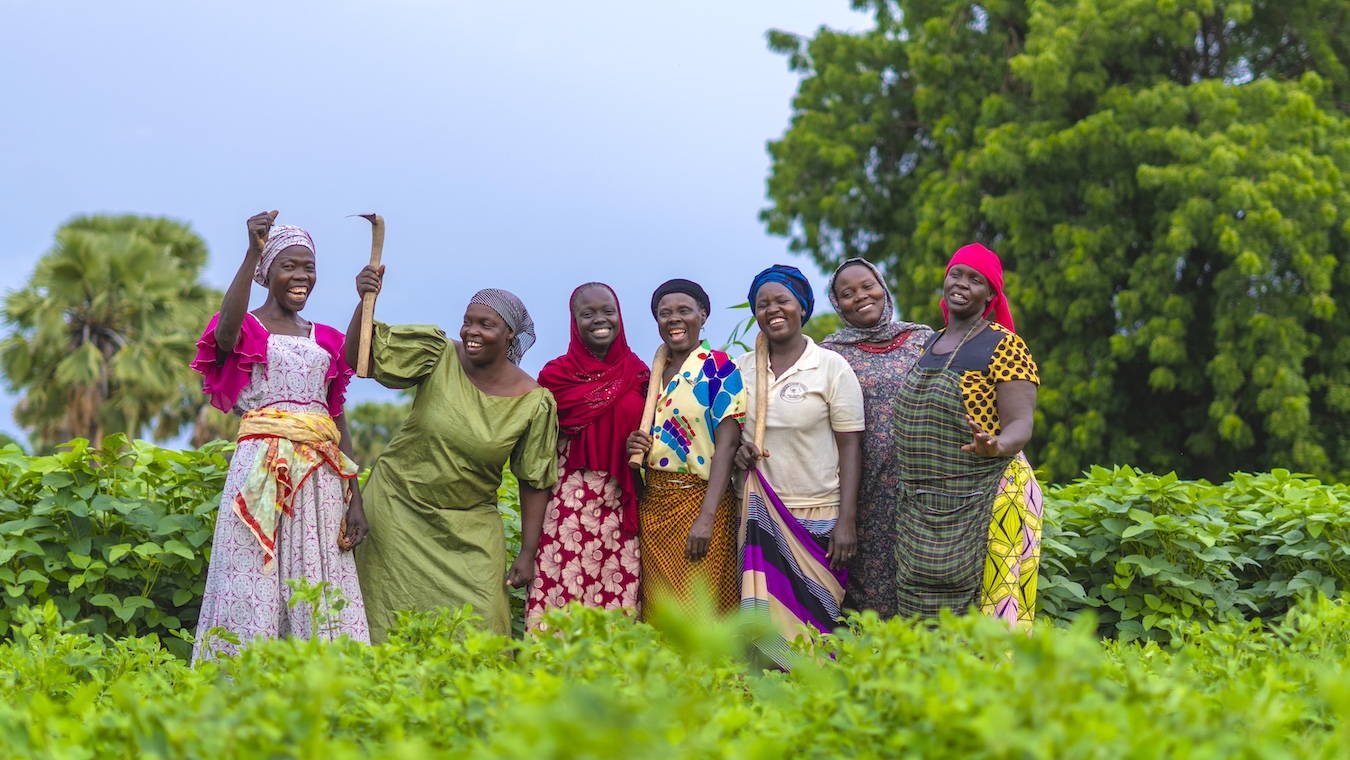
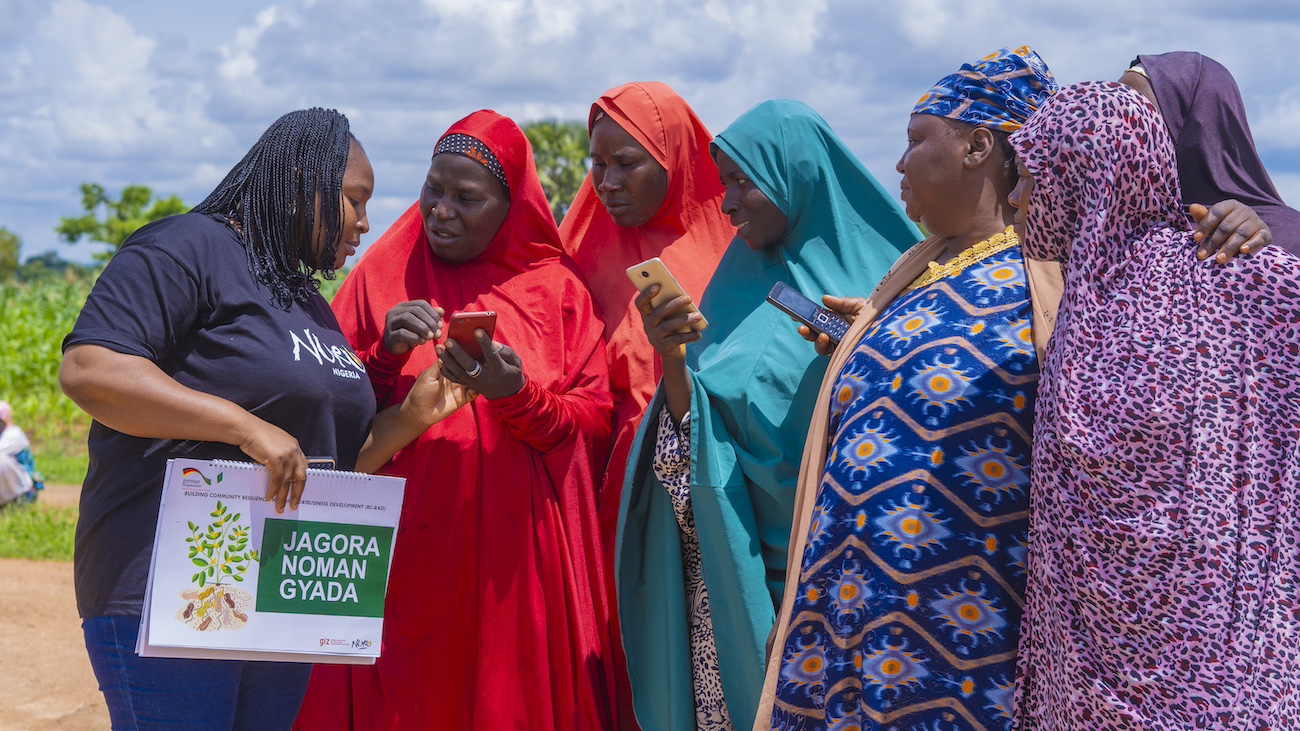
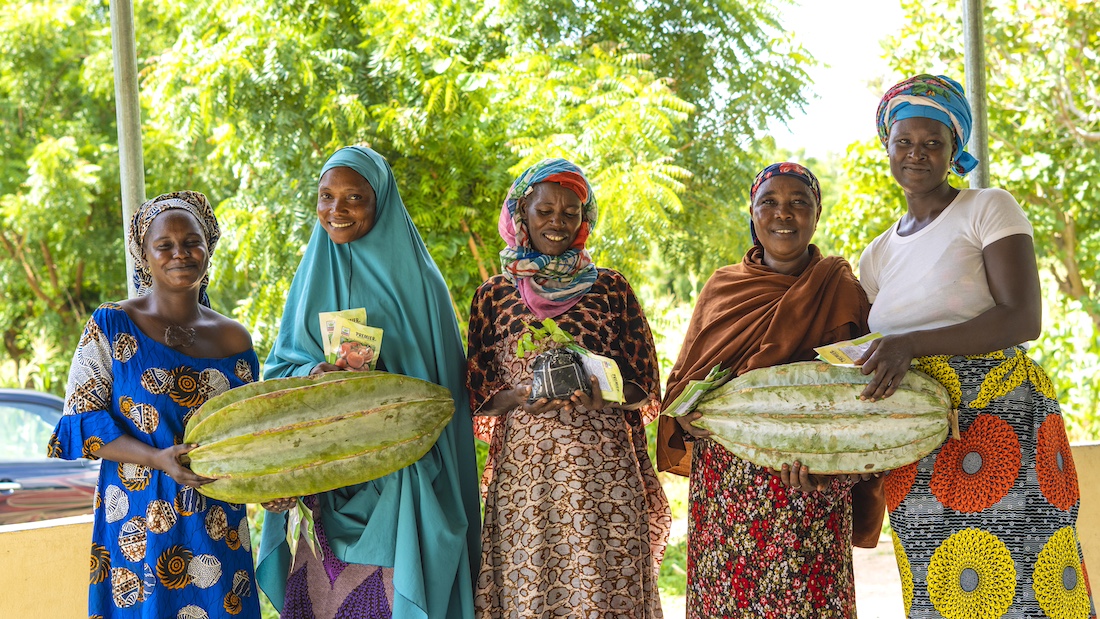
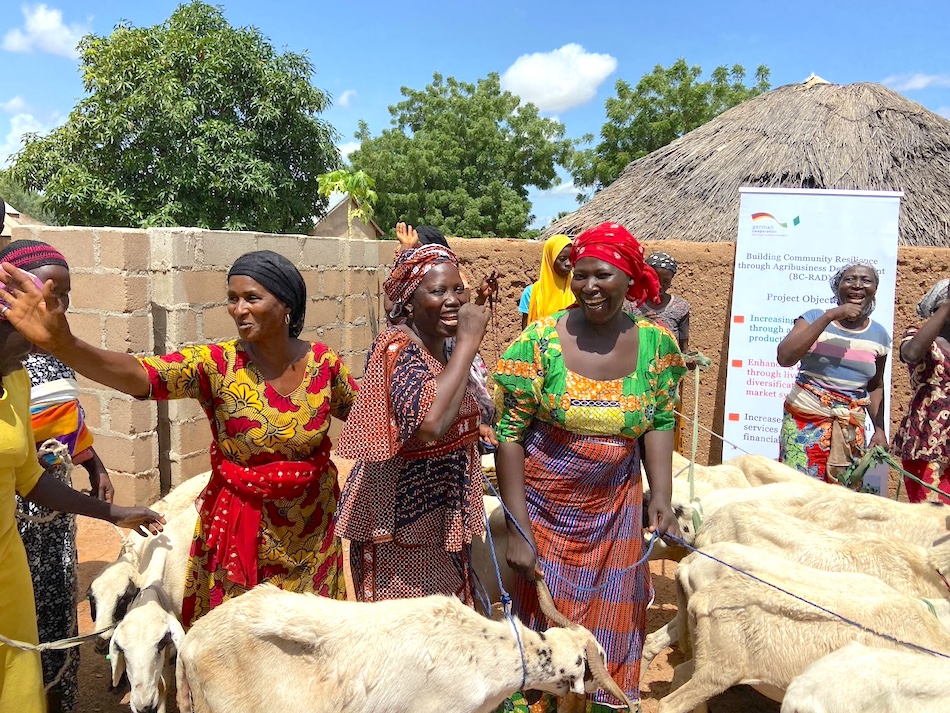
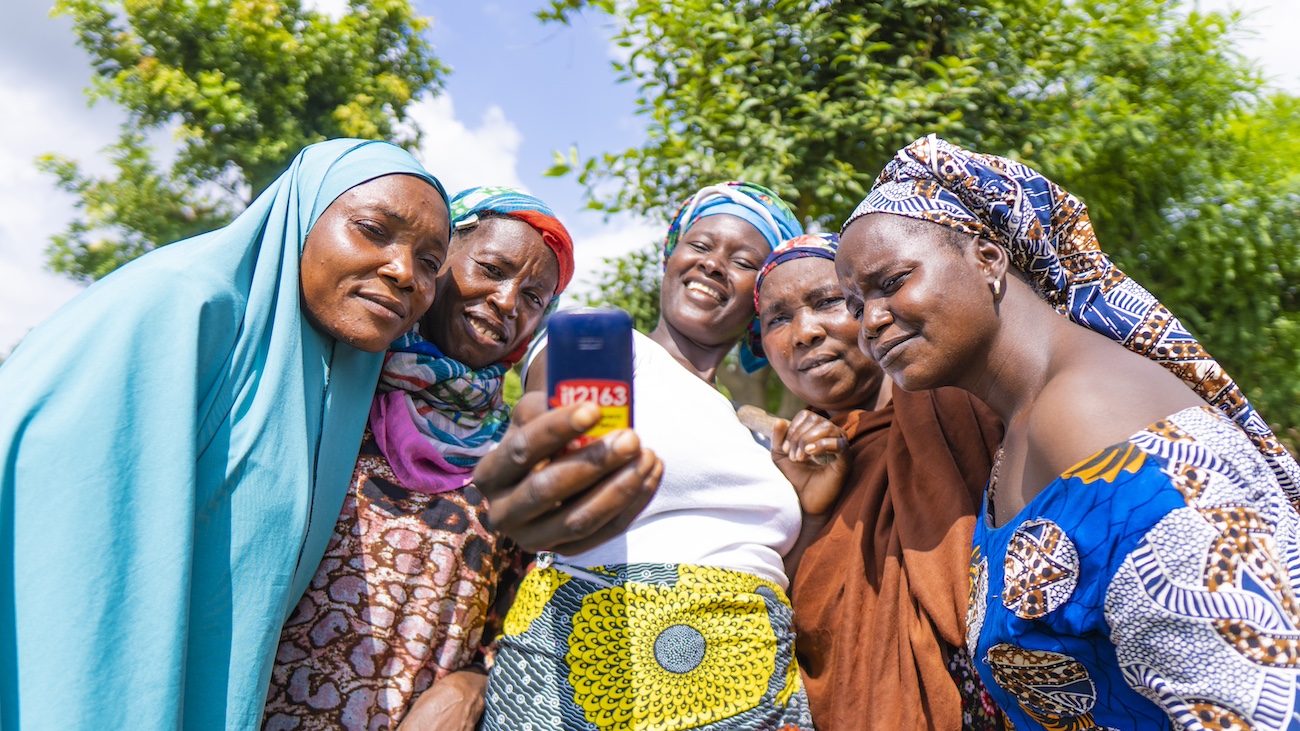
Our Team
We are a 100% Nigerian organization working to improve the lives and livelihoods of our fellow Nigerians in some of the most vulnerable and marginalized communities in our country.
Strategic Leadership Team
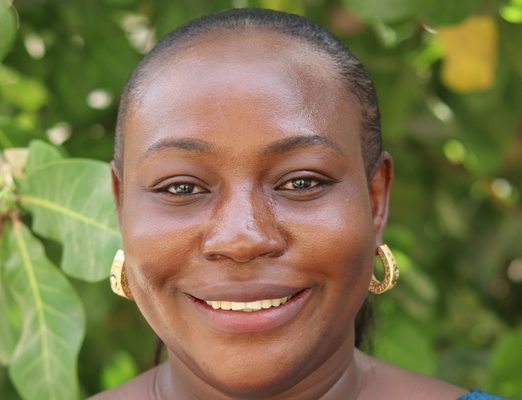 Amy Gaman
Managing Director
Amy Gaman is an impact-driven leader who has significantly contributed to building resilience in northeast Nigeria. With about fifteen years of professional experience in humanitarian and development work, Amy has established herself as a passionate advocate for social and environmental justice.
As the Managing Director of Nuru Nigeria, Amy leads a team of professionals in implementing programs that address critical social issues in the region, including social and behavioural change and regenerative agri-business development. Her leadership and innovative approach to development programming significantly impacted the lives of communities affected by conflict and poverty in the region.
Amy also contributed to the reintegration of Chibok Girls through her work as Assistant Coordinator with the Atiku Abubukar Center at American University of Nigeria. Amy was also an integral team player in the strengthening integrated delivery of HIV and Aids Services by Family Health International 360, where she was the program coordinator for the UNHCR IDP Profiling and Vulnerability Screening Project; Amy was also a volunteer coordinator for UNHCR. She also led as Chief of the Party for Building Sustainable Livelihoods Activity, a holistic and integrated program for Agricultural and Economic Growth in Nigeria which fostered social cohesion, climate adaptation and community resilience.
She has received awards for her work, including recognition from the British Council through the Northeast Humanitarian Hub, the Amazon Leadership Award in human resource management and the Northern Youths Leadership Award from Arewa House. Amy also continues volunteering in policy formulation through ONE Campaign and The Kukah Center, understanding that political leaders need to be engaged for sustainable change.
Amy holds a Bachelor’s degree in Human Anatomy from the University of Maiduguri, a Master of Business Administration from Business School Netherlands and a Master of Art Peace and Conflict Studies from Modibbo Adama University (in-view). She has several postgraduate certifications from the American University of Nigeria, including in Project Management, Business Communication and Leadership. Amy is a Perennial Leadership Fellow New York 2021 cohort and an Acumen West Africa Fellow.
Amy Gaman
Managing Director
Amy Gaman is an impact-driven leader who has significantly contributed to building resilience in northeast Nigeria. With about fifteen years of professional experience in humanitarian and development work, Amy has established herself as a passionate advocate for social and environmental justice.
As the Managing Director of Nuru Nigeria, Amy leads a team of professionals in implementing programs that address critical social issues in the region, including social and behavioural change and regenerative agri-business development. Her leadership and innovative approach to development programming significantly impacted the lives of communities affected by conflict and poverty in the region.
Amy also contributed to the reintegration of Chibok Girls through her work as Assistant Coordinator with the Atiku Abubukar Center at American University of Nigeria. Amy was also an integral team player in the strengthening integrated delivery of HIV and Aids Services by Family Health International 360, where she was the program coordinator for the UNHCR IDP Profiling and Vulnerability Screening Project; Amy was also a volunteer coordinator for UNHCR. She also led as Chief of the Party for Building Sustainable Livelihoods Activity, a holistic and integrated program for Agricultural and Economic Growth in Nigeria which fostered social cohesion, climate adaptation and community resilience.
She has received awards for her work, including recognition from the British Council through the Northeast Humanitarian Hub, the Amazon Leadership Award in human resource management and the Northern Youths Leadership Award from Arewa House. Amy also continues volunteering in policy formulation through ONE Campaign and The Kukah Center, understanding that political leaders need to be engaged for sustainable change.
Amy holds a Bachelor’s degree in Human Anatomy from the University of Maiduguri, a Master of Business Administration from Business School Netherlands and a Master of Art Peace and Conflict Studies from Modibbo Adama University (in-view). She has several postgraduate certifications from the American University of Nigeria, including in Project Management, Business Communication and Leadership. Amy is a Perennial Leadership Fellow New York 2021 cohort and an Acumen West Africa Fellow.
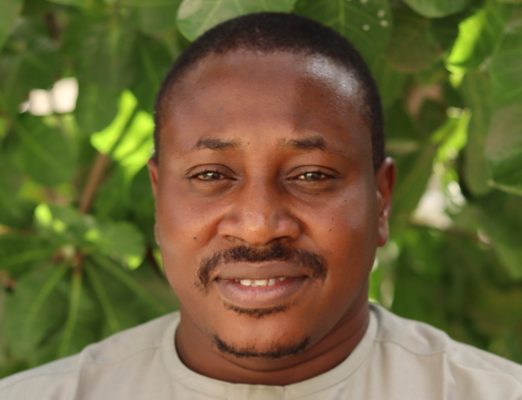 Simon Eli
Leadership & Partnership Director
Simon holds a B. Tech in Urban and Regional Planning as well as an M. Tech in infrastructure along with several certifications in program design and project management. Simon joined the fight to end extreme poverty after several years of being a tutor in higher institutions, he believes knowledge creates wealth. After experience living as a refugee in northern Cameroon during the time when his home community was part of Boko Haram’s caliphate, Simon is passionate about providing the people of northeastern Nigeria opportunities for hope and meaningful choices.
Simon Eli
Leadership & Partnership Director
Simon holds a B. Tech in Urban and Regional Planning as well as an M. Tech in infrastructure along with several certifications in program design and project management. Simon joined the fight to end extreme poverty after several years of being a tutor in higher institutions, he believes knowledge creates wealth. After experience living as a refugee in northern Cameroon during the time when his home community was part of Boko Haram’s caliphate, Simon is passionate about providing the people of northeastern Nigeria opportunities for hope and meaningful choices.
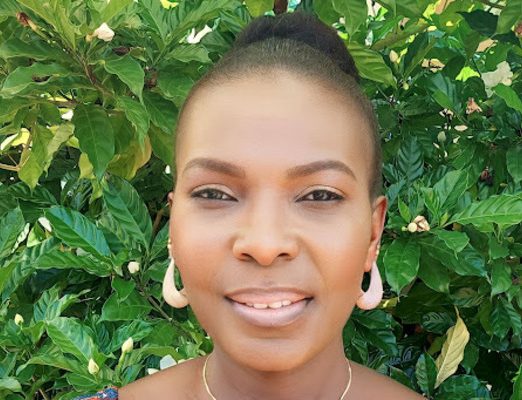 Judith
Human Resources & Administrative Manager
Judith holds a Master’s Degree in Public Administration. She belongs to the Chartered Institute of Personnel Management (CIPM) of Nigeria as an Associate Member. She brings a wealth of experience in managing HR and administrative functions across diverse industries such as Education, Manufacturing and Non-Government Organisations. Her career journey has encompassed various leadership roles in both HR and administration, making her a versatile and experienced professional.
Judith believes in the potential of an empowered and well-supported workforce. Her core philosophy revolves around aligning HR and administrative strategies that will create an environment where employees can thrive, enabling the organization to attain its objectives. She promotes a workplace that supports innovation, fosters collaboration, and prioritizes well-being, driving organizations to new levels of excellence.
Judith
Human Resources & Administrative Manager
Judith holds a Master’s Degree in Public Administration. She belongs to the Chartered Institute of Personnel Management (CIPM) of Nigeria as an Associate Member. She brings a wealth of experience in managing HR and administrative functions across diverse industries such as Education, Manufacturing and Non-Government Organisations. Her career journey has encompassed various leadership roles in both HR and administration, making her a versatile and experienced professional.
Judith believes in the potential of an empowered and well-supported workforce. Her core philosophy revolves around aligning HR and administrative strategies that will create an environment where employees can thrive, enabling the organization to attain its objectives. She promotes a workplace that supports innovation, fosters collaboration, and prioritizes well-being, driving organizations to new levels of excellence.
Staff
 Bless
M&E Coordinator
Bless
M&E Coordinator
 Humshe
Project Coordinator
Humshe
Project Coordinator
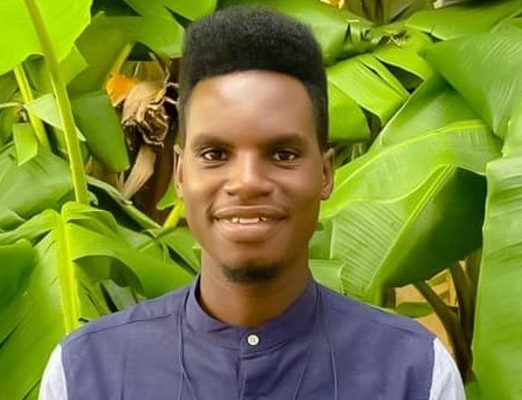 Reuben
Facility Assistant/Driver
Reuben
Facility Assistant/Driver
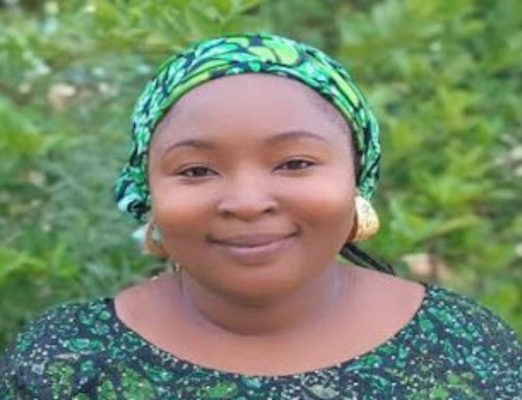 Sharon
Project Officer
Sharon
Project Officer
 Amos
Field Office Coordinator
Amos
Field Office Coordinator
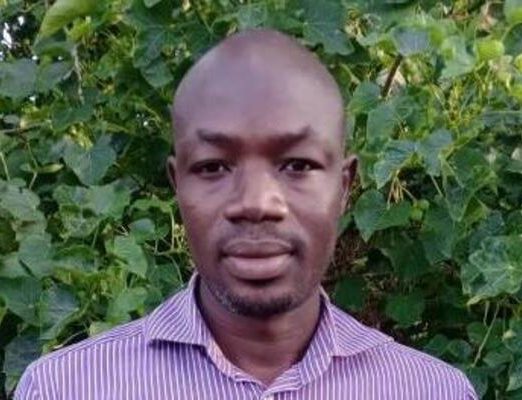 Samson
Project Assistant - Gombi
Samson
Project Assistant - Gombi
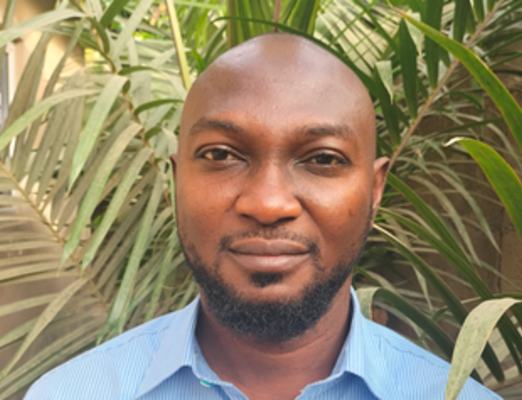 James
Project Officer
James
Project Officer
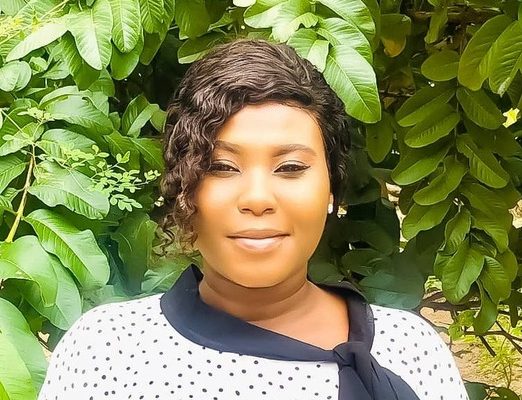 Petina
Impact Training Assistant
Petina
Impact Training Assistant
 Daniel
Program Officer
Daniel
Program Officer
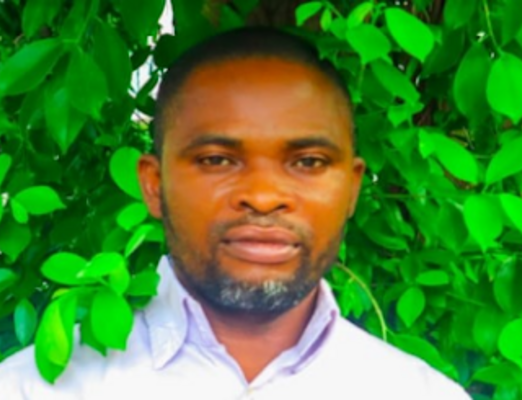 Jegede
Grant & Compliance Officer
Jegede
Grant & Compliance Officer
Funders and Partners
Nuru Nigeria is proud to be supported by and a member of a system of change-makers supporting northeast Nigeria.
Lend Your Support
Be Hope. Be Nuru.
When you give, you bring hope to farmer families and their communities.

Nuru Nigeria, Woman and Goat, 2023
Financials
Nuru Nigeria’s financials are managed by a third-party accounting agency to ensure rigor and transparency. Through this innovative partnership, our team can focus our efforts more on adapting, improving, and scaling our operations.
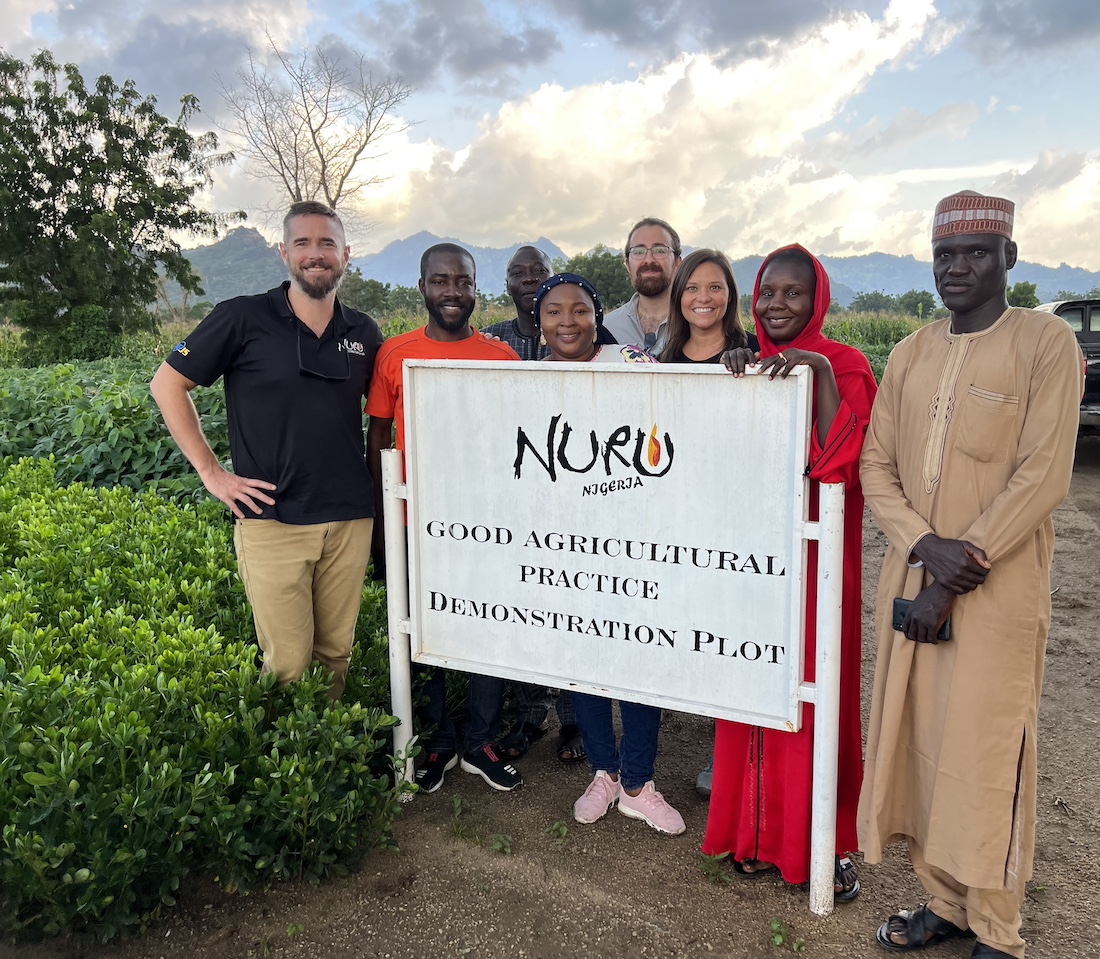
Nuru Nigeria, Demonstration Plot Site, 2022
FAQs
-
Why is your organization named Nuru? What does that mean?
Nuru is a Kiswahili word meaning light or hope. As an organization, we aim to inspire hope in marginalized communities that experience systemic injustices and the compounding issues of instability and poverty. To learn more about our approach, click here.
-
What are market linkages?
In its simplest form, a market linkage is the formal or informal relationship between a buyer and a seller of a good or service. In Nuru’s work, this relationship is between cooperative agribusinesses and private-sector consumer-facing companies or traders. Nuru local organizations act as facilitators and mediators, helping to develop trust and efficiencies between buyers and sellers that do not currently exist and that lead to stable business partnerships and, eventually, contracts.
-
How does Nuru work with women? Does Nuru work exclusively with women?
Nuru adheres to the gender minimum standards across interventions. Nuru organizations work through a women-first approach, and encourage women’s participation in leadership and decision-making roles in their communities. Nuru recognizes the importance of inclusivity in its approach, advocating that sustainable progress towards equality necessitates the active involvement of men, women, and youth in interventions. Learn more here.
-
What does climate change adaptation mean?
Climate change adaptation is the action of adjusting our behaviors, systems, and ways of life to the present and future impacts of climate change. Adaptation is focused on reducing the risks associated with harmful climate-related events and, where applicable, utilizing any potential opportunities, like longer growing seasons. Learn more here.
-
What is resilience?
Resilience is the capacity of a system or person to withstand or recover quickly from a shock or stressors. Especially while working in vulnerable and marginalized communities, Nuru cannot unlock economic potential without building resilience to shocks and stressors experienced by the local community. Much of the resilience is context-specific to the areas in which Nuru works. For instance, while one community may be primarily concerned with instability due to violence, another area may experience relative peace, but widespread drought. Communities often experience a combination of many different stressors all at once. To learn more about how Nuru measures its impact on resilience capacities, please see the Nuru Nigeria Resilience Study.
-
What is economic potential?
By ensuring rural people have the opportunity to act on their knowledge, skills and abilities, Nuru supports their journey in achieving their unique economic potential. Economic potential is the capacity to produce goods and services. As an entrepreneurship-promoting organization, Nuru promotes the perspective that financial gains must be bounded by environmental, social and economic responsibility. Nuru believes in an optimistic world where human ingenuity and collaboration contribute to shared prosperity. Nuru works to provide an enabling environment, through business development services and training that remove barriers for youth, women and marginalized populations, equipping them to tap into their vast economic potential.
Contact Us
Want to learn more about our work or support our efforts? Use our contact form to reach out.
"*" indicates required fields


